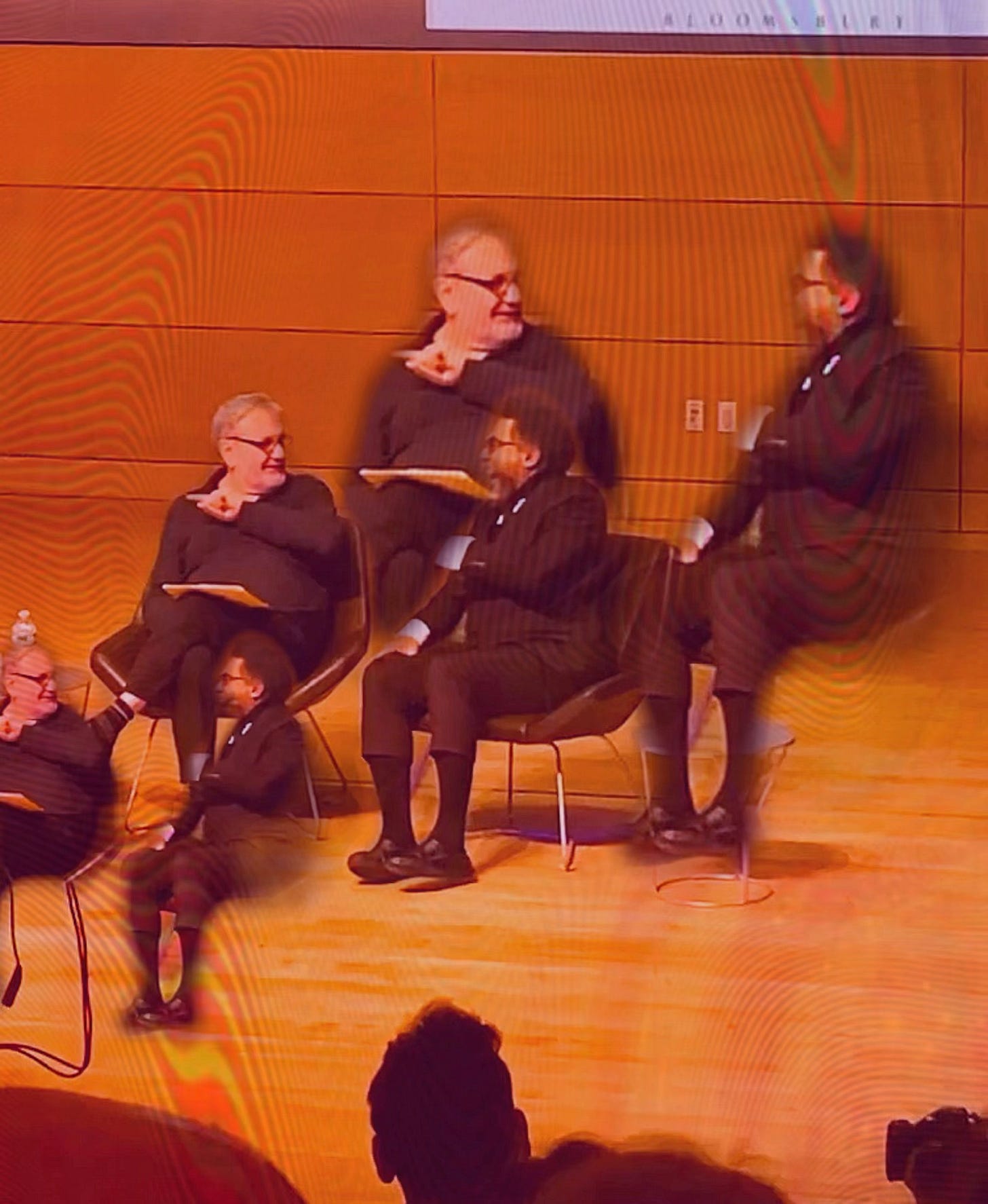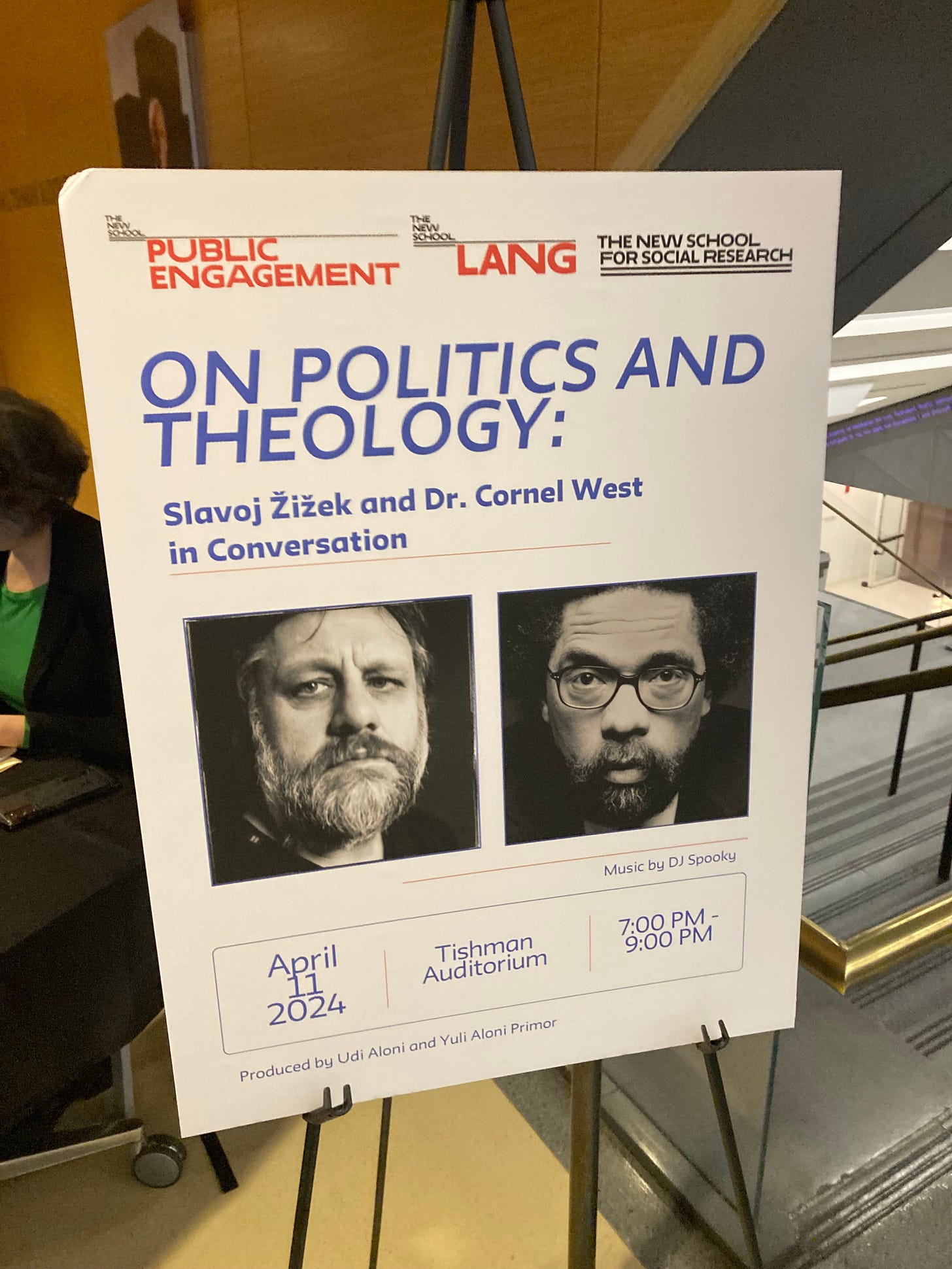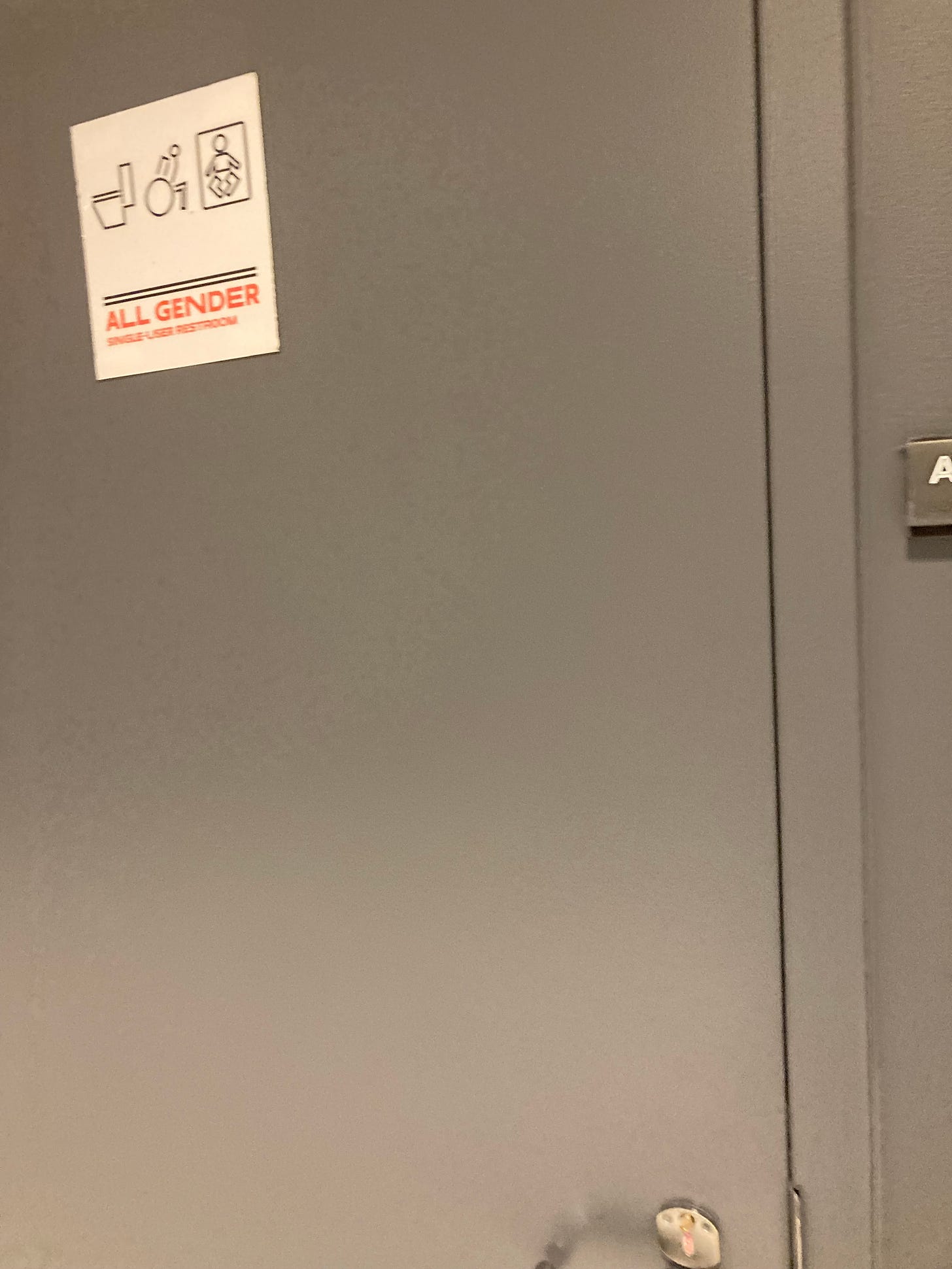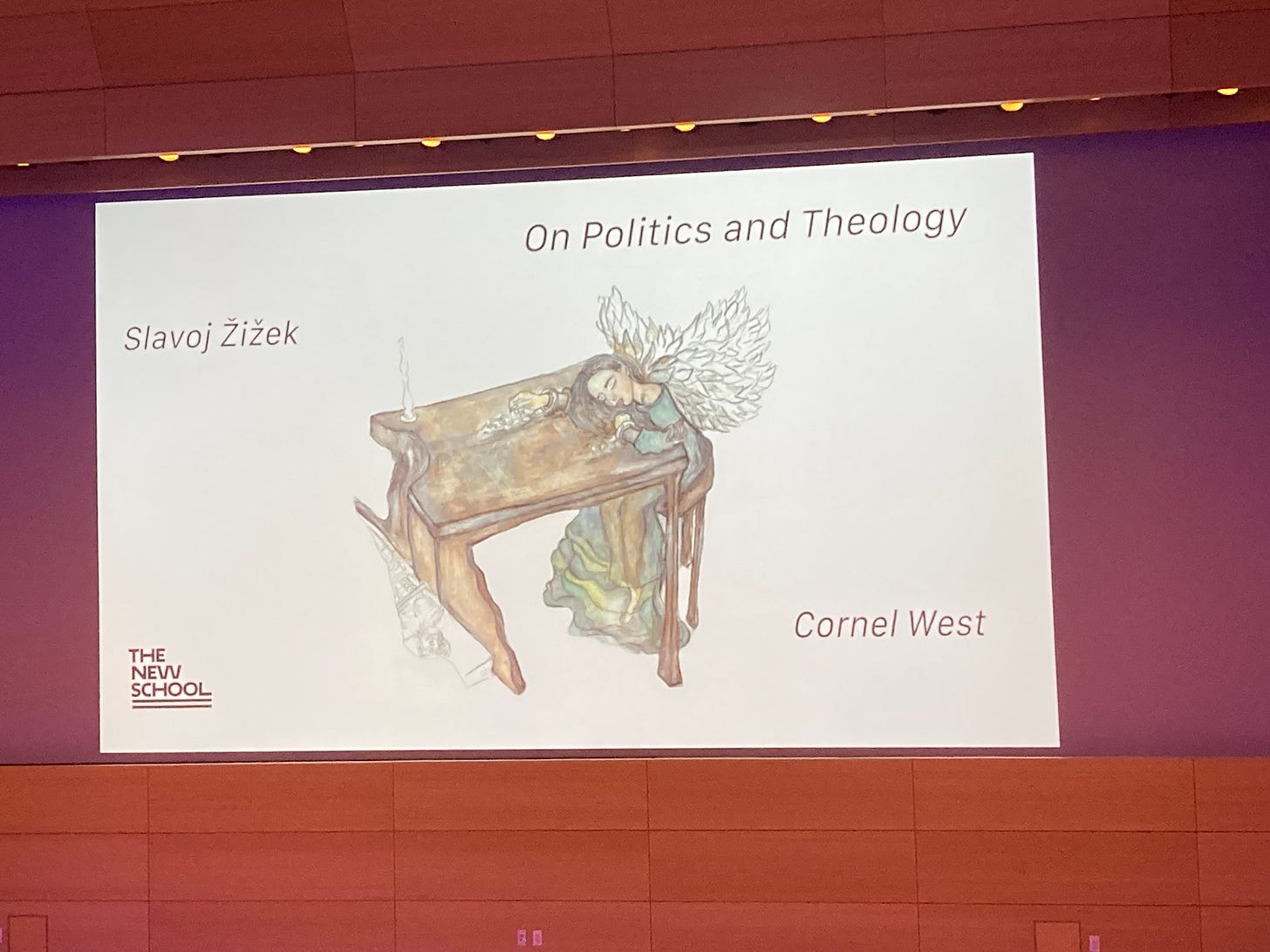At the point when Easter dinner with family reached a lull and it felt socially appropriate to whip out my phone and start doomscrolling, I stumbled upon an ad for a panel discussion between two deific public intellectuals: Drs. Cornel West and Slavoj Zizek…on theology and politics. Clearly, an Easter miracle. A sign of Jesus’ resurrection from the dead being a fact: the impossible becoming a reality.
Letting Apple almighty auto-fill in the registration form to get on the waitlist, I was determined–inshallah–to attend this glorious panel discussion. Three days later, the New School kindly “apologized” for not being able to take me off the waitlist–the room was booked. But at least I could watch the livestream.
I do not serve a virtual God, who slides into my DMs to communicate his love to me and paid for my sins using Bitcoin. My God entered the flesh–thus, there was no way in hell, heaven, or purgatory I’d settle to watch this talk on my puny, budget-friendly Microsoft Surface. I was determined to attend in person.
After begging about fifteen different people with connections to Zizek, West, and the New School to do a brother a favor and pull some strings, I was left stranded in an abyss of despair. Waiting in the desolate tomb of Holy Saturday, floating around in Hades–certain that my resurrection day would come.
At Mass the next morning, I approached the statue of Saint Joseph to the right-hand side of the altar, stuffed some dollar bills under his feet and lit a candle. Being a superstitious Latin [Mediterranean] Catholic, I know that when one asks something of St. Joseph–be it through putting money under his statue, burying his statue upside down in front of your lawn, or carrying his statue while walking on your knees up to the altar–he will, in the words of Mariah Carey, make it happen (contrary to the reservations of some Puritanical **cough** Irish Catholics).
“Listen my guy, you’re gonna need to make this happen. Ok? I am going to that talk. And that is final. K thx luv ya bai.”
As I sauntered out of the church, Jesus’s foster daddy telepathically told me to write an email directly to Zizek. I’ve written Zizek before, asking him to come onto the pod. Shockingly, he always replies with unshockingly Zizekian replies like “sorry, am now ill and inoperative, cannot engage in anything.” or “Really sorry, I don't know what is happening with me, but I am simply unable to concentrate and work. Sad.” But my faith in St. Joseph convinced me that this request would make it through.
An hour later, I was on the guest list to attend the talk. Genesis 41:55 for the win.
The morning of the talk, my being boiled over with anxious anticipation. But much to my chagrin, I scrolled upon a post from UnHerd about Brother West’s VP pick. Melina Abdullah is an activist with ties to BLM, who has made a name for tweeting that “Nobody White should ever refer to the nation of Niger. Periodt.” I’m sure Ms. Abdullah has done a great deal to alleviate the burden of the oppressed. But seriously?
It seems that Brother West’s idealism has reached new heights. Clearly, he had not read my Newsweek piece about how he is the ideal horseshoe candidate–a leftist with the capacity to capture trad-minded voters (but Laurel Duggan, the author of the UnHerd piece, clearly did…thanks for hyperlinking me, sis). Clearly, he did not intend to win…let alone to build any sense of viability in this election. Periodt.
(He also should’ve read
’s piece in Cracks in PoMo about his campaign…but it’s not too late for you to read it.)I busied myself with “work” as the blessed moment approached. It was recommended I arrive a half hour early. Assuming the train ride would take about 45 minutes, I started getting ready an hour and fifteen minutes before. But my spergy indecisiveness about outfit options delayed me…almost as long as both the R and the D trains were delayed (thanks for nothing iMaps…and no, I will never convert to Google Maps or Waze. Enough of my cookies are being tracked already).
I settled on my James Franco selfie t-shirt that I purchased off an eBay shop, likely inspired by Franco’s infamous 2013 NYTimes op-ed on selfies as a mode of pomo performativity. My wearing it was a metacommentary on the topic of the evening, the ontotheology of secular narcissism, the inverted iconography of the selfie, a paean to the god of the postmodern self. I feared, momentarily, that the New School radicals would attack me for paying homage to a self-professed groomer, but assuaged my fear by putting on my keffiyeh, which would likely cancel out my act of political incorrectness.
To top it all off, I threw on my late grandfather’s varsity jacket with the name of his home city–NEWARK–stitched diagonally across the front.
As the trains took an absurd amount of time to arrive, I scrolled through X, catching a post from fellow writer Alex, who boasted being second place in line to enter the auditorium. “meanwhile im still stuck on the train…” I replied. He sent me his prayers, as I started losing my patience. “Jesus help me…” I muttered under my breath, clearly to the alarm of the two Slavic girls waiting next to me…likely wondering if I was to be the cause of the next Citizen alert about a psych ward escapee wreaking havoc in the subway.
I bolted out of the station, running past a Mitzvah truck, wondering if they’d be offended by my keffiyeh–but then remembered that if they were ultra-Orthodox they were not very likely to be staunch Zionists. I shook the rain off my jacket and fluffed my hair as I made my way onto the line for check in, snapping a pic of the event poster and posting it to my story in order to enflame the mimetic envy of the theorygrammers.
“Last name, Adubato… A D U B A TO.” The New School Karen claimed she couldn’t find my name.
But I was not having it.
“Zizek sent me an email confirming I’m on the guest list. See?” My inner entitled white girl oozing out of me like sweat.
“Yeah, I’m sorry, but you’re not on the list.”
“But he literally sent me this email. It’s Zizek. I work with Compact. Zizek is one of our editors.”
“You’re going to have to wait…I’m sure there will be room soon enough.”
I stood off to the side, seething with rage, muttering curses under my breath with the hopes that New School Karen would see I was not playing…that I was psycho enough to cause a scene–knowing full well that I was too much of a suburban snowflake to pull that off. I scrolled through the gram to see if I got any reactions. Martyr asked me if I got in yet. Jerusha said she would consider sneaking in with me.
“I’m about to fight a b***h,” I replied back.
But out of the corner of my eye I caught a glimpse of another registration table, manned by a seemingly better-adjusted young student worker–and clearly more competent. He managed to spell my name right and found it within seconds.
“Alhamdulillah!” I exclaimed with revelry. Alex’s prayers clearly work.
I went to make a pit stop in the bathroom, briefly considering entering the gender neutral restroom (when in Rome). I paused to take a bathroom selfie, hoping Franco would be proud of my metacommentary on my metacommentary of his metacommentary on the art of the selfie.
I made my way into the auditorium, saying my hellos to the West campaign team and squeezed my way into a seat.
Walking out to uproarious applause from the crowd, the two were then introduced by Dean Kate Eichhorn, who reminded everyone of the school’s commitment to both free speech and ensuring safe spaces of respect and tolerance…how exactly that maps out on an institutional level, one can only wonder…
She warned that we would be sticking to a strict schedule out of respect to the schedule of the staff–Teamster members–whom she did not intend to make work over time. She also noted that the book singing would be hosted by P&T Knitwear, an independently owned bookstore, adding to the pro-worker vibe–part and parcel of the New School’s unique brand of leftism that is so outlandish, so radical, that it is more compelling than it is cringe.
The stage was set with three chairs separated by side tables reserved for West, Zizek, and the event’s producer Udi Aloni–who abdicated his role as moderator, trusting that the two were mature enough to handle themselves, warning that he’d jump in to intervene if things got out of hand. West moved the side table between him and Zizek, insisting that there can’t be distance between those engaging in a Socratic Dialogue.
Zizek, the self-proclaimed Chestertonian “atheist Christian,” indicated that the third chair would be reserved for God–whose advent, despite not believing in him, he would await anyway, adding his favorite line from Matthew’s Gospel: “when two or three are gathered in my name, I am in the midst of them.”
Hot Takes
The Jester and the Prophet
We all know Zizek has a zest for making a point of saying politically incorrect things. He advocates calling his black friends slurs because–contrary to patronizing, paternalistic SJWs–it demonstrates his equality with, respect for, and intimacy with them. Zizek is a court jester, a decadent, a moral amoralist with a crude sense of humor. While West may not be a moralistic prude, he is known for his decorum, his dignified manner of speaking–free of expletives…controversial and provocative–but never for its own sake.
Zizek clearly was on guard, filtering much of his words. He let slip out some “[bull]shits,” and the slur (?) “Oriental.” He asked permission before saying something vulgar (“how vulgar are we talking?” asked West, with caution), and spoke about rape in detail without giving a trigger warning. West let his merciful side trump his justice-conscious side, receiving Zizek with patience–which he had to do anyway given he could barely understand a word of Zizek’s heavy Slavic accent.
West often refers to the tension of tragedy and comedy that human existence is constantly pulled between. Life is full of suffering. There is no way around this. Thus it must be confronted. Yet, we feeble humans are not adequately equipped to face tragedy head-on. We need to be detached; we need the “cushion” of comedy. We must learn not to take ourselves too seriously, as we are not God, and–especially for Christians–our tragedies are not the end of the story.
Life is a pendulum swinging between ecstasy and agony, joy and pain, decadence and ascesis, the aesthetic and the ethical. Many have attempted to hold the pendulum in one position for too long, yet it always ends up smacking them back in the face. Some have tried to fix it in the middle, but existence is not static. The ball must keep rolling. Ask Wilde. Ask the Stoics.
The joining of these two archetypal figures on one stage, the jester and the prophet, the playful and the grave, gave us a snapshot of the ideal approach to life–allowing space for this tension, for these opposing forces to argue with and embrace each other, to laugh and cry together, without trying to cancel the other out, forging an ideal synthesis.
The two converged around the modern world’s tendency to reduce catastrophes–crises that implicate a sense of awe, horror, wonder…to probe deeply into our souls and cry out into the universe for the intervention of a transcendent force–to mere problems that can be solved mechanistically.
This reductive, flattening mentality is seen in the attempt to collapse the tension between the tragic and the comic–to be pure moralists without any sense of humor, or to be pure decadents without any sense of the consequences of our actions. The inevitable result:
-Morality without the prophetic dimension, without the awareness of the fact that we are not gods, that we are fallen human beings dependent on the transcendent–the ultimate source of truth and justice–puffs us up with self-righteous pride, making idols of ourselves, tempting us toward tyranny, violence…incapable of feeling mercy for the moral failings of others since we no longer recognize our own. Thus, no one is moral.
-Decadence without any sense of the ecstatic, of pleasure being a gift from a benevolent Other, an occasion for joyous rapture–albeit with limits and the capacity to lead to self-isolation and violence…or flattening itself into mere entertainment, distraction, instinctive indulgence, scratching an itch. Thus, no one is actually enjoying themselves…and absolutely no one is funny.
For them, the tragic forces us to gaze deeply into our souls, and the comedic leads to ecstatic jouissance, pulling us toward our interior depths and launching us outward toward that which is beyond. West cited the examples of jazz musicians, of writers and poets…making frequent reference to Newark greats like Amiri Baraka, Sara Vaughn, and Philip Roth (I shimmied into my jacket with pride). We–like them–must learn to wrestle with the paradoxes that make up our being, grapple with contradictions, improvise, weave our way through the pain and joy of life…seeking something “more” that is both beyond and present within our midst.
PoMo Theology
The two of them converged in their critiques of neoliberalism, PMCs, the naive trust in “secular” neutrality, and religious nationalism/fundamentalism…giving off whiffs of their mutual friend John Milbank and his deeply postmodern Radical Orthodoxy project.
On the woke side of things, this translated into a condemnation of rigid fundamentalism and ethnonationalism…especially when religion is co-opted as a tool for the State–blatant idolatry in their eyes, employing God as an excuse for violence, and elevating the idea of “the nation”–an ideology, an abstraction–to the level of a god.
But on the flip side of this coin–the based side, that is–is the risk of idealizing a totally neutral secular state–which simply does not exist. They both hold to the belief that humans are religious creatures, we are inclined to worship; whether God exists or not, we will always create Gods. To enforce the illusion of a secular state is a recipe for social collapse…and the rise of tyrannical, totalitarian (and probably nationalistic) regimes.
Liberalism is an illusion. Woe to those who think there is such a thing as a “free,” autonomous individual…those who proclaim empty slogans like “le present, et seulement le present” or “il est interdit l’interdire.” There is no such thing as “starting from scratch” without tradition. Surely, traditions need to modified, but one cannot simply begin from zero, create their own truth, their own reality or identity…besides, such thinking enabled the colonizers to genocide countless indigenous people.
Their take on capitalism was nuanced, with West insisting that capitalism does indeed create more freedoms, while also doubling the instances of oppression, and with Zizek saying every culture must at one point or another go through capitalism and modernity…there’s no way around it.
One is either charming or tedious
Last year, I wrote on the Zizek v. Peterson debate saying that it
reminded me of how boring someone can be while having all the “right answers” on paper, and how fascinating someone can be when having all the wrong answers on paper. As Wilde once said, “It is absurd to divide people into good and bad. People are either charming or tedious.” Similarly, Zizek himself recently asked “why be happy when you can be interesting?” I think part of what makes Zizek so charming, so interesting despite having several “bad” ideas, is the simple fact that he’s breathing in Slavic rather than Anglo-American air, and that he’s a (Lacanian-)Freudian.
I left the event feeling similarly. I strongly disagree with both West and Zizek on several points.
West’s worldview is deeply Protestant, American, and progressive in the classical sense of the term. His idealism lacks a healthy dose of realism, his regard for the transcendent lacks regard for the earthly, his vision of morality lacks space for decadence, his metaphysics lacks–well, metaphysical realism…in the Thomistic/Aristotelian sense. He constructs what I see to be a false dichotomy between “prophetic” Christianity and “Constantinian”' institutional Christianity.
As a Catholic, and as a Latin (again, Mediterranean, not Latinx), I believe in the Incarnation wholeheartedly and all of the paradoxes that come along with it. I believe you can’t have Christianity without an institution, a hierarchical structure of authority–as corrupt as it often turns out to be. I believe that humans can aspire to reach lofty moral ideals, but will always fall short–thus the need for the sacraments, especially that of confession.
His view of Christian social justice is informed by the liberal Protestant tradition, and mine is informed by Pope Leo XIII and Dorothy Day, whose “both/and” approach recognizes that adherence to dogma and authority, that personal morality–namely to the evangelical counsels of poverty, chastity, and obedience–are inextricably linked to justice for the poor and oppressed, for workers and migrants.
His idealism explains why he picked Ms. Abdullah as a running mate rather than someone who is more moderate or traditional than he is, expressing that he didn’t want to pick someone who would “make Dr. King turn over in his grave.”
He is naive about the limits of progress, of human idealism, about the capacity of the prophetic dimension of faith to thrive without dogma and hierarchical institutions.
And clearly, I don’t see eye to eye with Zizek–an atheist Maoist Communist–in many other regards.
And yet, as much as I may not agree with them “on paper,” on an ideological or theoretical level, I find them to be much more agreeable on a “human” level than those I do agree with on paper. I find their personas, their manner of living and expressing themselves to be much more compelling than any other public intellectuals. Surely there are plenty of Catholics whose theological, philosophical, moral, and political ideas I agree with–but I can’t say I find any of them to be as appealing as this duo. I may not agree with their ontological purview, yet I find them to be more “ontologically” convincing–meaning, I find their way of “being” to be convincing, attractive…to the point that I rather emulate them than most others I do agree with on most things. There’s something so real about them on an experiential, even spiritual level…they have a charisma and joie de vivre matched by few.1
The event forced me to ask if Wilde was right (of course he was, as always), and if I’d rather place my energy in being “right,” or in being fully “alive” (the answer, of course, is both…just ask St. Ignatius of Antioch).
As I made my way out with my signed copy of Christian Atheism: How to be a Real Materialist in hand, I lit up a ciggie, watching the crowd of other smokers engage in spirited discussion about what transpired.
A young British woman asked to bum a cig off me. As we puffed away on our mellow yellow American Spirits, I asked her what struck her most.
“You know that part when he said the thing about the Holy Spirit being present when two people are gathered together? That was amazing.”
“Yes,” I replied. “Especially when two or three are gathered with an American Spirit.”
She chuckled.
The alleged atheist Christian indeed spoke Gospel-truth that evening.
I walked away praying for the Spirit to ignite a revival capable of cracking through the ever-tragic and ever-comical remains of our postmodern moment.
Please consider signing up for a paid subscription to this page for more riveting content.
Sorry if you weren’t able to make it in person…not everyone can be God’s favorite e-boy. But at least you can watch the recording!
If you’re new to Cracks in Pomo, check out the About page or read up on our Essentials. Also check out our podcast on Spotify, Apple, and YouTube and follow us on Instagram and Twitter.
MASA tortilla chips by Ancient Crunch is offering our followers 10% off their order with the promo code CRACKSINPOSTMODERNITY. Click here to redeem.
I felt the same way about Avital Ronell at Compact’s Blame Theory podcast launch (though I do not aspire to emulate her unprofessional behavior, of course).














Love this piece. So glad I found Cracks...you are expressing thoughts and ideas that have been torturing me -- as just a person in the pew (or, in last several years, NOT in the pew) -- and couldn't seem to put into words.
I'm coming away from this piece feeling I want to be fully alive more than I want to be right; that I can't start from scratch, with no tradition-dogma (though I want my faith to be much more "organic" -- right here, and not always looking "out there"). To not distinguish so much between "Church/church" and "not-Church/church" (which this piece does marvelously), and to cultivate eyes to see and ears to hear the Spirit, wherever and however and in whomever we encounter it. (I love Richard Rohr's references to the "Christ-soaked world.") To be willing to live more lightly with tragedy and comedy (my own personal, and writ large). To recognize and sit with the tension between naive liberal Protestant progressivism and the Catholic knowledge that we can't do it on our own (I don't like the term "fallen..." It begs the question "fallen from what," which opens up a whole new cans of worms).
In general, I feel starved for a real companionship of faith and have never managed to find it (or make it) in a parish or in Catholic adult faith formation (which seem to me to be lacking...I don't want to be endlessly pointed back to the Catechism. Isn't the Catechism our Alpha and not our Omega, if you will...a crude map, and not the destination...a kind of frame on which a real House can be built?)
Thank you so much for getting these thoughts percolating in this particular reader!